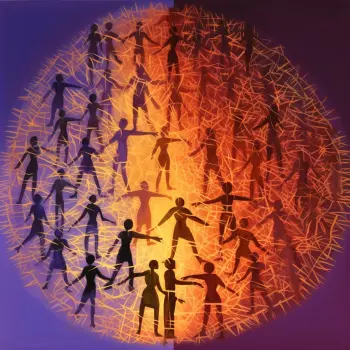Editors' Note: This article is part of the Patheos Public Square on the Future of Faith in America: Judaism. Read other perspectives here.
Over 2000 years ago the rabbinic sage Ben Bag Bag defined our Jewish path this way:
Turn Her and turn Her for everything is in Her. Investigate Her, grow old and worn with Her, and never abandon Her. You can find no better life than this. (Pirke Avot 5:26)
The Her is Torah, not simply the Five Books of Moses, but the entirety of Jewish wisdom written and oral. Judaism is a never-ending conversation with greater Torah and the sages who comment on Her. And because our turning never ends we can be sure it is not answers we are looking for, but better questions. Judaism is a path of endless inquiry, questioning, argument, and doubt. And while our turning Torah has no end, it does have a direction:
A Gentile came to Hillel claiming he would convert to Judaism if the rabbi could teach him the entire Torah while he stood on one foot. Hillel replied, "What is hateful to you, don't do to another. This is the whole Torah, the rest is commentary. Go and learn it." (Talmud, Shabbat 31a)
The entire Torah is the Golden Rule, and everything else is commentary on it. That is to say that Judaism, as Hillel understood it, is a way of justice and compassion. Everything else — history, holy days, mitzvot, liturgy, etc. — is commentary, that is to say a resource for living the Golden Rule in our personal and communal lives.
I open with these two teachings because we cannot talk about the future of Judaism — near term or long term — without having a definition of Judaism in mind. Mine comes from Hillel and Ben Bag Bag: Judaism is the way of Torah Turning for the sake of justice and compassion.
With this definition in mind I can now ask about the future of Judaism, the future of Torah Turning in service of justice and compassion, and when I do I must say it is bleak.
• • •
Torah Turning is a dialogical path performed in hevruta, learning pairs. Each haver (literally friend, but in this context learning partner) is an ezer k'nego to the other. Ezer means "one who helps," k'negdo is "one who opposes." An ezer k'negdo is one who helps you grow by opposing your tendency to settle for the easy, the conventional, the safe, and the self–serving. The job of a haver as ezer k'negdo is to sharpen you and your ability to question. So important is the work of Turning Torah with a haver that our sages taught, o havruta o mituta (Talmud, Ta'anit 23a), which Talmud scholar Jacob Neusner translates as "Give me havruta or give me death."
The reason the future of Judaism is so bleak is that we are no longer training Jews to Turn Torah in hevruta. Judaism has shifted from a religion of questions to a religion of answers, and in so doing falls victim to the problem to which all answer-based systems fall: we outgrow the answers they cherish.
• • •
Judaism has shifted from a process to a product. It is no longer something we do, but something to which we adhere or align ourselves.
To be a Jew in the context of Judaism as product is to be a consumer of that product, and only that product. The quality of your Jewish life is determined by your loyalty to the product. And this loyalty is fading.
According to the 2013 Pew Forum report entitled "A Portrait of Jewish Americans," 22 percent of all Jews and 32 percent of Jewish Millennials describe themselves as having no religion. These Jews identify as Jews ethnically, but not spiritually. Many of them (although how many we don't know) fall into hybrid camps such as JuBus, HinJews, and Jewfis, (Jewish Buddhists, Jewish Hindus, and Jewish Sufis respectively); that is, Jews who respect their lineage as Jews but who find themselves better fed by religious practices and spiritual wisdom in other religious traditions.
A close examination of those Jews who do claim Judaism as their religion, however, suggests that they too are really not being fed by the religion of Judaism. According to Pew, 62 percent of American Jews say "being Jewish is mainly a matter of ancestry and culture, while just 15 percent say it is mainly a matter of religion." ("A Portrait of Jewish Americans," p. 8)
What the vast majority of American Jews are rejecting is Judaism as product. Why? This may become clear when we define just what the product Judaism is.




